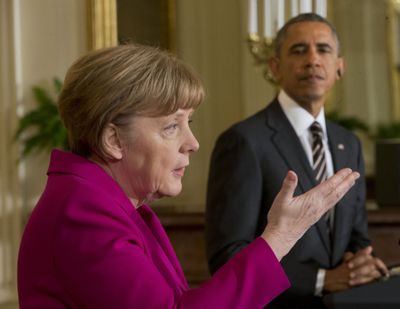Obama, Merkel back Ukraine diplomacy
President hints at providing defensive aid

WASHINGTON – President Barack Obama and German Chancellor Angela Merkel rallied behind efforts to reach a long-shot diplomatic resolution to the conflict between Russia and Ukraine on Monday, but they offered no clear path for how the West would proceed if talks this week fail.
During a joint White House news conference, Obama dangled the prospect that the U.S. could for the first time send anti-tank weapons and other defensive arms to Ukraine. While no decision has been made, the president said he had ordered his team to consider “whether there are additional things we can do to help Ukraine bolster its defenses in the face of Russian aggression.”
Merkel staunchly opposes arming Ukraine’s beleaguered military. The German chancellor, who has perhaps the most productive relationship with Russian President Vladimir Putin, made clear she had not given up on the possibility that diplomatic negotiations could produce an elusive peace plan.
“It has always proved to be right to try again and again to sort such a conflict,” Merkel said through a translator.
Later Monday, during a joint news conference with Canadian Prime Minister Stephen Harper in Ottawa, Merkel reiterated, “I hope that we shall be able to solve this conflict by diplomatic means because I think by military means it cannot be solved.”
Harper said he admires the efforts by Germany and France to bring about a peaceful solution but added: “Unfortunately at this time Mr. Putin has rejected diplomatic means. He seems to move his agenda through military violence.”
The U.S. and Europe have focused on economic sanctions in their punitive actions against Russia. The penalties, along with plummeting oil prices, have caused significant damage to Russia’s economy.
The European Union decided Monday to temporarily hold off on ordering more sanctions on the Russians and Ukrainian separatists while awaiting the outcome of this week’s peace talks.
The U.S. and Europe have largely been in agreement on their response to the conflict between Russia and Ukraine, raising the possibility that a public split over lethal aid is merely a tactic to push Putin to strike a deal to end the fighting. Obama and Merkel both repeatedly said Monday that the U.S. and Europe would stay united in efforts to stop Russian provocations.
In eastern Ukraine on Monday, a powerful explosion rocked a chemical plant and set it on fire outside the separatist stronghold of Donetsk. Rebels said government shelling had hit the plant, which lies in the middle of Ukraine’s industrial heartland.
On Monday, Ukraine said about 1,500 Russian troops had crossed the border into Ukraine via rebel-controlled border posts over the weekend, but military spokesman Andriy Lysenko did not provide any proof.
A senior administration official said Obama’s national security team has been discussing a range of options for helping the Ukrainian military hold its ground in the east. However, the options have not formally been presented to Obama yet, according to the official, who was granted anonymity.
The president gave no indication Monday of how quickly he would make a decision on possibly ramping up military assistance, nor did he indicate whether there was a specific development that might trigger that step.
“The measure by which I make these decisions is, is it more likely to be effective than not,” he said.